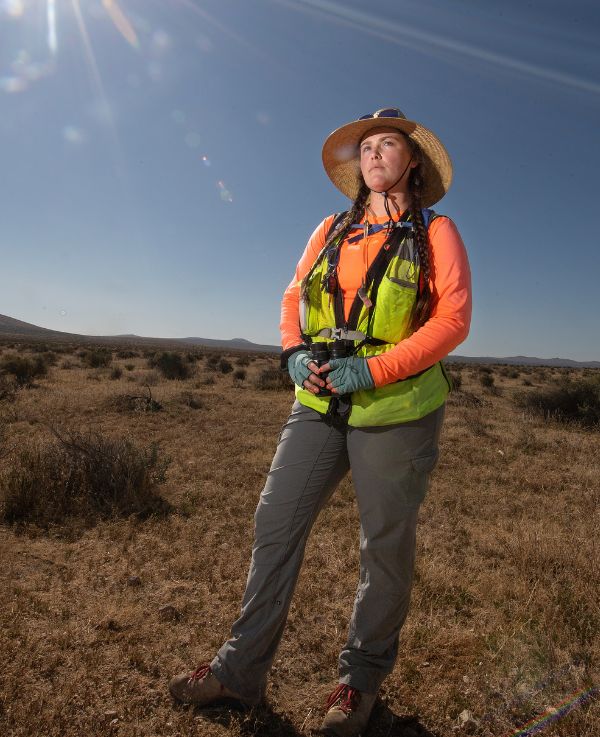
Broncos On The Rise: Alexandra Dorough Flourishes While Protecting California's Flora and Fauna
Alexandra Dorough
Environmental Biology
Class of 2020
Alexandra Dorough’s chosen career would not appeal to everyone.
For starters, there’s the 4 a.m. wakeup time so that she can be out the door by 5 for the long drive to job sites, many of them in the Mojave Desert. Then there’s the gear she needs to protect her from the elements as she spends hours painstakingly pacing the desert floor, ever on the lookout for rare plants such as western Joshua tree (Yucca brevifolia) and alkali mariposa lily (Calochortus striatus).
But Dorough (’20, environmental biology) — who began her job as an assistant biologist in the Redlands office of ECORP Consulting Inc. in February 2020, just weeks before COVID-19 pandemic restrictions went into effect — enjoys the mix of outdoor fieldwork and in-office report writing.
“It’s really great, never the same,” she says.
Dorough and her ECORP colleagues are on a mission to help developers in California comply with state and federal environmental laws as they plan and build projects, and to ensure that they do not ride roughshod over the state’s many threatened and endangered plants and animals. ECORP consults with public and private clients.
“Say there is a proposal to build a housing development on pretty much untouched land,” Dorough says. “It’s our job to survey that land for endangered and threatened plants and animals.”
Dorough grew up in Claremont and spent about three years completing her required general education courses at Mt. SAC in Walnut. Craig Petersen, a Mt. SAC biology professor, planted the seeds of her interest. She then transferred to Cal Poly Pomona, where she took botany classes with Edward Bobich, a professor in biological sciences, who helped strengthen her interest in California’s diverse flora.
“Say there is a proposal to build a housing development on pretty much untouched land,” Dorough says. “It’s our job to survey that land for endangered and threatened plants and animals.”
Dorough acknowledges that she didn’t grow up in a family that regularly hiked and camped.
“If you had asked me at 19 if I was outdoorsy, I wouldn’t have said yes,” she says. “Now I totally am, especially during the February-to-July field season.” (But she hasn’t sworn off her former “girly-girl city girl” persona. “I wear long acrylic nails during the off-season,” she quipped.)
The outdoorsy Dorough has spent hours documenting the Mojave’s spindly Joshua trees, which for years have been ravaged by air pollution, rising temperatures and wildfires. She also has surveyed for animals including desert tortoise (Gopherus agassizii), desert kit fox (Vulpes macrotis arsipus) and burrowing owl (Athene cunicularia).
She wonders how the recently enacted Western Joshua Tree Conservation Act will affect the species. The new legislation prohibits unpermitted removal of Joshua trees and creates a fund to acquire and manage habitat. Developers who remove Joshua trees to build renewable energy or housing projects would be required to pay into the conservation fund.
Dorough says she feels fortunate to be working in a career that allows her to make a difference for nature. She says she believes that she and her colleagues can help threatened and endangered plants and animals to recover.
“I’m still growing my skills,” she says. “There is so much for me to learn.”
She’s contemplated going back to school to get her master’s degree, but for now, she is delighted to be part of the effort to protect California’s shrinking population of Joshua trees.
“I’m just glad that more people are falling in love with them,” she says. “This is the only chance they have.”
